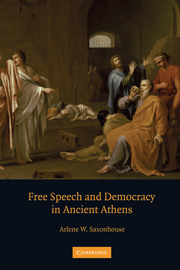Book contents
- Frontmatter
- Contents
- Acknowledgments
- Prologue: Four Stories
- PART I INTRODUCTION
- PART II AIDÔS
- PART III PARRHÊSIA: THE PRACTICE OF FREE SPEECH IN ANCIENT ATHENS
- PART IV THE LIMITS OF FREE SPEECH
- 6 Truth and Tragedy
- 7 Thucydides' Assemblies and the Challenge of Free Speech
- 8 Protagoras' Shame and Socrates' Speech
- Conclusion: Four Paradoxes
- References
- Index
7 - Thucydides' Assemblies and the Challenge of Free Speech
Published online by Cambridge University Press: 06 January 2010
- Frontmatter
- Contents
- Acknowledgments
- Prologue: Four Stories
- PART I INTRODUCTION
- PART II AIDÔS
- PART III PARRHÊSIA: THE PRACTICE OF FREE SPEECH IN ANCIENT ATHENS
- PART IV THE LIMITS OF FREE SPEECH
- 6 Truth and Tragedy
- 7 Thucydides' Assemblies and the Challenge of Free Speech
- 8 Protagoras' Shame and Socrates' Speech
- Conclusion: Four Paradoxes
- References
- Index
Summary
“[T]here were two circumstances in the working of the Athenian democracy which imparted to it an appearance of greater fickleness without the reality: – First, that the manifestations and changes of opinion were all open, undisguised, and noisy: the people gave utterance to their present impression, whatever it was, with perfect frankness: if their opinions were really changed, they had no shame or scruple in avowing it: Secondly – and this is a point of capital importance in the working of democracy generally – the present impression, whatever it might be, was not merely undisguised in its manifestations, but also had a tendency to be exaggerated in its intensity.” Thus wrote George Grote in the middle of the 19th century.
Thucydides' History, renowned for the sharpness of its analysis of relations between states, for the exposition of a “realism” that openly admits that “the strong rule where they can,” includes within it descriptions of a series of deliberative Assemblies where citizens discuss among themselves the future actions that the city will take. Whether the speakers there spoke “with perfect frankness” and “had no shame” should their opinions change, as Grote writes, is the question for this chapter. Thucydides records speeches from four such democratic Assemblies for our consideration. This chapter will look at three of those Assemblies, the Athenians deliberating about the punishment to be inflicted on the rebellious island of Mytilene, the Athenians deliberating about whether to set sail for the conquest of Sicily, and the Syracusans deliberating about whether they should prepare for an attack from the Athenians.
- Type
- Chapter
- Information
- Free Speech and Democracy in Ancient Athens , pp. 146 - 178Publisher: Cambridge University PressPrint publication year: 2005

